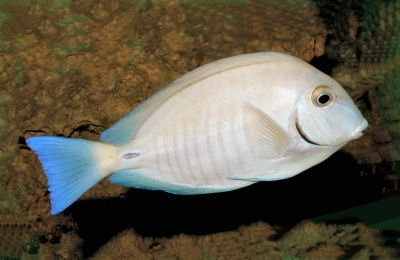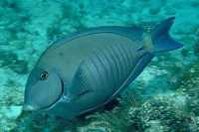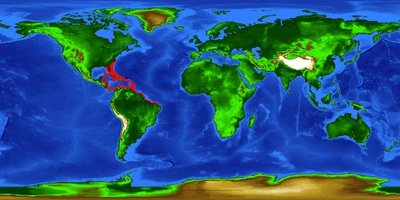Doctorfish (Biodiversity)
Contents
- 1 Doctorfish
- 1.1 Introduction The doctorfish (scientific name: Acanthurus chirurgus) is a member of the surgeonfish family (Family Acanthuridae) that lives on coral reefs (Doctorfish) in the Atlantic Ocean and the Caribbean Sea (Caribbean Sea large marine ecosystem). {| width="330" border="1" cellspacing="1" cellpadding="1" align="right" |- align="center" | Doctorfish. Source: Reef Fish Identification, New World Publications © 1994 |- align="center" | Scientific Classification Kingdom: Animalia (Animals) Phylum:--- Chordata Class:------ Osteichthyes (Bony Fishes) Order:-------- Perciformes Family:-------- Acanthuridae (Surgeonfishes) Genus:----------Acanthurus Species:--------- Acanthurus chirurgus (Bloch, 1787) |}
- 1.2 Physical Description
- 1.3 Distribution
- 1.4 Habitat
- 1.5 Feeding Behavior
- 1.6 Reproduction
- 1.7 Associations
- 1.8 Conservation Status
- 1.9 References and Further Reading
Doctorfish
Introduction The doctorfish (scientific name: Acanthurus chirurgus) is a member of the surgeonfish family (Family Acanthuridae) that lives on coral reefs (Doctorfish) in the Atlantic Ocean and the Caribbean Sea (Caribbean Sea large marine ecosystem). {| width="330" border="1" cellspacing="1" cellpadding="1" align="right" |- align="center" | |- align="center" | Scientific Classification Kingdom: Animalia (Animals)
Phylum:--- Chordata
Class:------ Osteichthyes (Bony Fishes)
Order:-------- Perciformes
Family:-------- Acanthuridae (Surgeonfishes)
Genus:----------Acanthurus
Species:--------- Acanthurus chirurgus (Bloch, 1787) |}
Physical Description
Doctorfish range in length from 18 to 39 centimeters. The oval body of this species has 10 to 12 dark body bars running along their bodies that can range from bluish gray to much darker. The pectoral fin is dark on the leading edge. Individuals may change color by either lightening or darkening their coloration. Like all surgeonfish, doctorfish have a sharp "scalpel" on the base of their tail.
Distribution
Doctorfish have a subtropical distribution ( 22 - 25°C; 37°N - 7°S; 89°W - 34°W). In the Western Atlantic they range from Massachusetts (USA), Bermuda, and the northern Gulf of Mexico to São Paulo, Brazil. In the Eastern Atlantic they are found in Senegal.
Habitat
Doctorfish live on coral reefs at depths ranging from two to 25 meters.
Feeding Behavior
Doctorfish are diurnal herbivores who feed on filamentous and fleshy algae using specialized spatula-shaped teeth. They also consume micro-invertebrates with the algae. They incidentally ingest a moderate quantity of inorganic material which can make up 40% of their stomach volume. Doctorfish pick up algae with their specialized teeth and swallow the algae whole. They have a gizzard-like organ in the intestine that is partially filled with sand particles to grind up food so it can be digested.
Reproduction
Doctorfish are group spawners that spawning in the evening in the water column. The tiny eggs (less thanone millimeterin size) contain a droplet of oil that makes them buoyant. They hatch in about 24 hours as small, translucent larvae that enter the pelagic stage. The larvae, known as acronurus, grow until the larvae settle on the coral patches in shallow water or in sea grass. Settlement usually occurs during the new moon when it is darker so the larvae are at lower risk of predation on. Once the larvae reach the reef, they metamorphose into juveniles in about a week. They reach sexual maturity in slightly less than one year and they may live for ten to eleven years.
Associations
Doctorfish ocassionally forage in schools with ocean surgeonfish.
In the Fernando de Noronha Archipelago in southwestern Atlantic, juveniles hold cleaning stations together with blue tang and sergeant major and graze algae as well as pick molted skin and parasites from green sea turtles (Chelonia mydas). After inspecting the turtle’s body the feeding fishes nip on the turtle’s skin (head, limbs, and tail), carapace, and especially, the flippers.
Conservation Status
Doctorfish are not considered to be a taxon at risk.
References and Further Reading
- Encyclopedia of Life. Curator: C.Michael Hogan. 2011. Acanthurus chirurgus (Bloch, 1787)
- Florida State University. 2010. Doctorfish
- Marinebio. 2010. Acanthurus chirurgus, Doctorfish
- P.Humann and N.Deloach (Editor) 1994. Reef Fish Identification: Florida, Caribbean, Bahamas. New World Publications, Inc. Jacksonville, FL. ISBN: 1878348078
- N.Deloach. 1999. Reef Fish Behavior, Florida, Caribbean, Bahamas. New World Publications, Inc. Jacksonville, FL. ISBN: 1878348280


